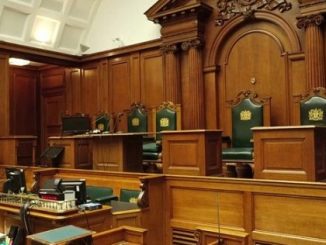
THE criminal justice system (CJS) in England and Wales is described as adversarial. This means that two parties (defence and prosecution) contest the facts of a case in front of a court. The two parties present opposing sides of the case, giving different perspectives on the evidence.
Lesser crimes are heard in a magistrates’ court, usually before three magistrates.
More serious crimes are referred on to Crown Court, to be tried before a jury of 12 people chosen at random from the general public. The magistrate/s or the Jury decide whether the defendant is guilty or not. At least 10 members of the Jury have to agree before a verdict can be taken. Two key tenets of criminal law in England and Wales are the presumption of innocence and the standard of proof. To find a defendant guilty, the Judge tells the Jury, they must be sure ‘beyond reasonable doubt’. Put simply this means the Jury has to be totally convinced of guilt.
Civil cases Civil cases are tried in a County Court or the High Court. They involve ‘disputes’, rather than crimes and the standard of proof needed to reach a decision is not so high. The Jury is told that it can pass a verdict based on ‘the balance of probabilities’. A person or company’s legal liability is determined if the evidence suggests that the individual is more likely to be guilty than not.
Juries in England and Wales are always told that they are ‘judges of the facts’ and the Judge is the ‘judge of the law’.
In practice what this means is that the Jury’s job is to weigh the evidence given in court, using their experience from everyday life to evaluate it.
The Judge’s job is to decide how and in what form that evidence is given to the Jury, or if certain evidence should be heard by the Jury at all. The Judge uses his/her knowledge of the law to decide these issues and if the defence or prosecution believes he/she has made a mistake, they can take the case to the Court of Appeal. An appeal can also be made if new evidence comes to light or if a legal mistake has been made. Most criminal appeals are over the length of sentence. Sometimes appeals go all the way to the Supreme Court and, finally, to the European Court.
THE AGENCIES INVOLVED IN ADMINISTERING THE JUSTICE SYSTEM
The Police Service
The Crown Prosecution Service (CPS)
The Court Service
Magistrates’ Courts
The Crown Court
The Appeal Court
The Prison Service
The Probation Service
The Serious Fraud Office
The Criminal Defence Service
The Criminal Injuries Compensation Authority
Other Victim/Witness Care Services.
The Home Office, Attorney General’s Office and Lord Chancellor’s Department are the three main government departments with responsibility for the CJS, providing the policy framework, objectives and targets, funding development and support functions. Their history and tradition is one of autonomy and independence.
For example, the Judiciary remains independent of political influence in their interpretation of the law and their judgements in a particular case. However, they are expected to work within certain frameworks for sentencing, set by Parliament, legislation and sentence guideline judgements and other Court of Appeal decisions.
Similarly, the Crown Prosecution Service remains independent in its decision as to whether to prosecute a particular case or not. This independence acts as a check on the system being used for political purposes.



Be the first to comment